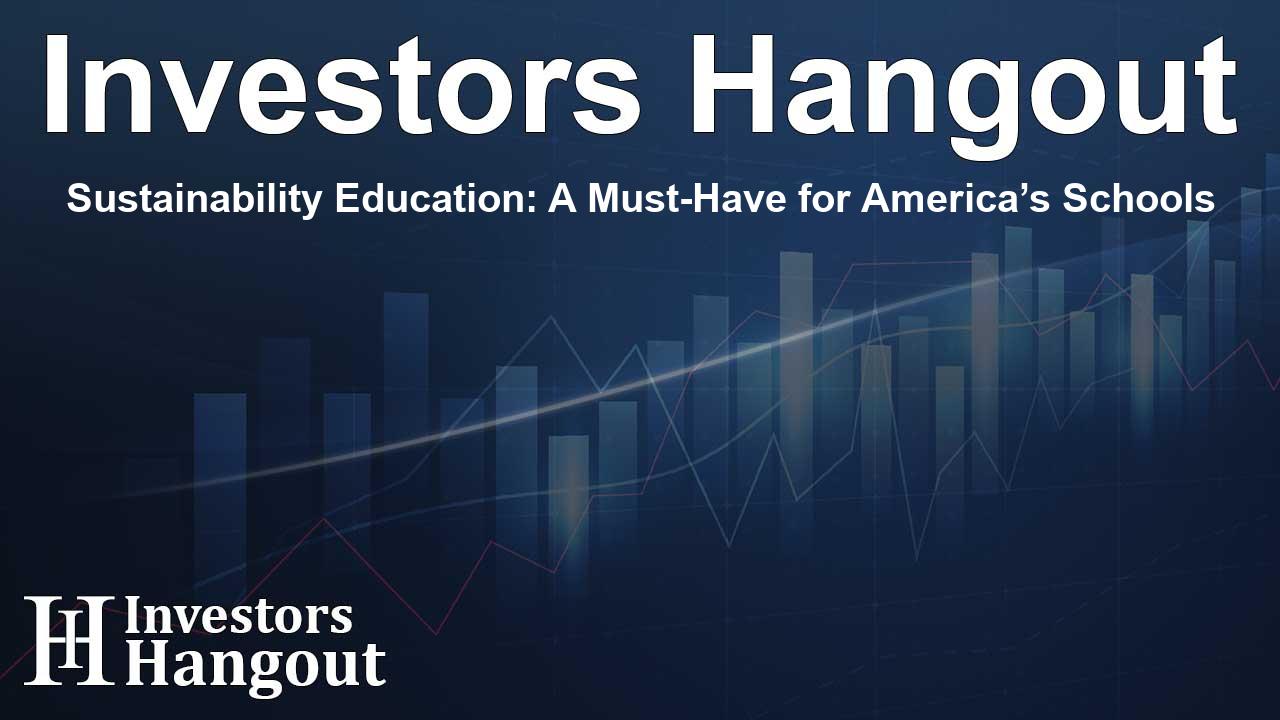Sustainability Education: A Must-Have for America’s Schools

The Importance of Sustainability Education in Schools
A recent survey has brought to light a noticeable gap in how Americans perceive sustainability education versus its actual implementation in schools. The survey, conducted by ALPLA, a prominent company specializing in innovative packaging solutions, indicates a widespread belief that sustainability education is crucial yet reveals unsettling deficiencies in how schools are managing this imperative area.
Survey Insights: What Do Americans Think?
According to the survey results, a remarkable 72% of Americans feel that sustainability education should be a fundamental component of school curricula. This reflects a growing awareness of sustainability's importance in addressing pressing social and environmental issues. However, only 28% of respondents believe that adequate funding is in place for such initiatives.
The Disconnect Between Belief and Funding
This stark contrast brings up essential questions about how well-prepared future generations will be in confronting the environmental challenges that lie ahead. Despite the overwhelming recognition of the significance of sustainability, insufficient financial resources and a lack of proper teacher training stand out as major barriers to effective implementation.
Key Findings from the Survey
The survey presented several critical insights regarding the current state of sustainability education:
- 79% of respondents advocate for the integration of sustainability concepts across all subjects.
- 68% believe that sustainability instruction should be a weekly occurrence, with nearly 30% favoring daily lessons.
- 80% of those surveyed deem sustainability education vital for the future health of the planet.
- 73% express their willingness to support increased funding for sustainability programs.
These findings illustrate a community eager for action but facing administrative hurdles that hinder progress.
Education's Vital Role in Shaping the Future
Billy Rice, the Sustainability Manager at ALPLA North America, emphasized the importance of consistent sustainability education. He stated, “Sustainability education is essential for empowering the next generation to tackle social and environmental challenges.” Rice's remarks highlight a collective recognition that integrating sustainability into various subjects is not just about knowledge acquisition; it is about preparing students to foster a sustainable future.
Call to Action for Schools and Policymakers
The data collected advocates for a systematic overhaul in how schools approach sustainability education. Stakeholders, including educators, policymakers, and community members, need to recognize the critical need for enhanced funding and resources to ensure that sustainability education is not merely a forgotten ideal but a living part of the curriculum.
ALPLA's Commitment to Sustainability
In alignment with the sentiment reflected in the survey, ALPLA remains committed to championing sustainability through innovation and education. By actively promoting a circular economy, their Plastic Reimagined initiative aims to alter public perceptions and encourage responsible recycling practices. The campaign's overarching goal is to cultivate an informed populace aware of the implications of plastic use and waste.
Join the Movement for Change
Working across the entire value chain, ALPLA collaborates with like-minded organizations focused on reimagining the future of plastic. They advocate for responsible use, effective recycling, and forward-thinking policies geared towards environmental protection. Through such initiatives, ALPLA emphasizes the importance of community involvement in shaping a more sustainable world.
Frequently Asked Questions
Why is sustainability education important?
Sustainability education is vital as it equips future generations with the knowledge and skills needed to address environmental challenges and promote eco-friendly practices.
What percentage of Americans supports sustainability education?
According to the survey, 72% of Americans believe that sustainability education should be core to school curricula.
What are the barriers to effective sustainability education?
The main barriers include inadequate funding and lack of proper training for educators.
How frequently should sustainability be taught in schools?
68% of respondents suggest that sustainability education should ideally occur at least weekly, with many advocating for daily instruction.
What initiatives does ALPLA support for sustainability?
ALPLA supports initiatives like Plastic Reimagined, focusing on a circular economy and collaboration across the value chain to promote responsible plastic use and recycling.
About Investors Hangout
Investors Hangout is a leading online stock forum for financial discussion and learning, offering a wide range of free tools and resources. It draws in traders of all levels, who exchange market knowledge, investigate trading tactics, and keep an eye on industry developments in real time. Featuring financial articles, stock message boards, quotes, charts, company profiles, and live news updates. Through cooperative learning and a wealth of informational resources, it helps users from novices creating their first portfolios to experts honing their techniques. Join Investors Hangout today: https://investorshangout.com/
Disclaimer: The content of this article is solely for general informational purposes only; it does not represent legal, financial, or investment advice. Investors Hangout does not offer financial advice; the author is not a licensed financial advisor. Consult a qualified advisor before making any financial or investment decisions based on this article. The author's interpretation of publicly available data shapes the opinions presented here; as a result, they should not be taken as advice to purchase, sell, or hold any securities mentioned or any other investments. The author does not guarantee the accuracy, completeness, or timeliness of any material, providing it "as is." Information and market conditions may change; past performance is not indicative of future outcomes. If any of the material offered here is inaccurate, please contact us for corrections.